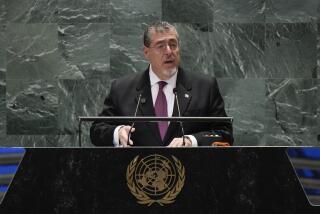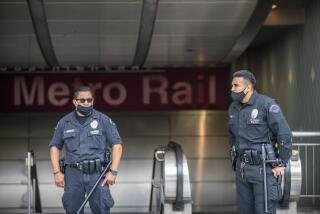Israel May Boost Police After Pullout : Mideast: Proposal would replace troops withdrawing from the territories with 10,000 officers. Officials cite security concerns, but plan has stirred controversy.
- Share via
JERUSALEM — Anticipating months of violence in the West Bank and Gaza Strip as its forces withdraw and Palestinians establish their own government, Israel is proposing to replace its troops with 10,000 police to protect Jewish settlers in the two regions and to help ensure overall security.
Police Minister Moshe Shahal said Saturday that Israel’s agreement with the Palestine Liberation Organization on autonomy can succeed but must be underpinned by the strongest possible security measures--otherwise it could be destroyed by political violence, Jewish as well as Palestinian.
Under its agreement with the PLO, Israel retains responsibility for the security of the West Bank and Gaza Strip until the end of the five-year period of autonomy. But Shahal’s proposal has aroused controversy as negotiators work out the way in which Israel will carry out that responsibility.
After a week of terrorist attacks by Palestinian radicals on Israelis and counterattacks by Israeli extremists on Palestinians, Shahal commented in an interview, “This continuing circle of killings is aimed at sabotaging the peace process, and we have a duty both to stop these murders and to protect the peace agreement.”
Friday evening, three Palestinians were shot dead by Israeli civilians near the West Bank city of Hebron. The ultra-Zionist group Kach, made up largely of American immigrants to Israel, said Saturday that it killed the men in reprisal for the murder by Muslim radicals of a Jewish settler and his son earlier in the week. The militant Islamic Jihad has now vowed revenge.
“The cycle of violence grows and grows, and if unchecked it could engulf the whole West Bank and Gaza Strip,” Shahal said. “We must act now and repeatedly in future months to break the cycle.
“Personally, I am sickened that Jews could go out and deliberately take three innocent lives to make some political point--and, at the same time, put at risk the agreement we reached with the PLO for the good of Israel.”
Shahal said that police have a number of good leads to the identities of the Israeli terrorists. He put the number of such extremists at no more than 20, but he said they could draw on a large circle of supporters in Israel and another abroad, principally in the United States.
“We are facing seven to nine months of violence, serious political violence,” Shahal said. “This is the most difficult period of the transition the Palestinians will be going through, and it will be difficult for us as well.
“We have no alternative. Neither does (PLO Chairman Yasser) Arafat. We can only go forward and fulfill the commitments we made. In this, security will be very, very important.”
Shahal, one of the strongest supporters in the Cabinet of the accord with the PLO, said he envisions his proposed 10,000-member Israeli police force working side by side with the new Palestine Police, expected to number 15,000, both in the West Bank and in the Gaza Strip.
The replacement of troops, now at their highest levels of deployment in five years, by police would signal Palestinians that the occupation is ending, Shahal argued, and thus help establish a new relationship of equality between Israel and the new Palestinian government.
“The Palestinians should feel the change, that something is very different,” Shahal said, “and the use of police rather than troops to maintain security would do that. Ultimately, there would be troops back there somewhere, but far away from the daily lives of the people.”
A second goal, he said, is assuring the 125,000 Jewish settlers in the Gaza Strip and West Bank of their security, both in their communities and when they are traveling to and from home, so that they will come to accept the concept of Palestinian autonomy and will not side with extremist groups fighting it.
“A major goal is to reassure the majority of settlers so they will not feel abandoned,” Shahal said. “They are naturally worried, but they are law-abiding citizens. They have no cause to take extreme measures, and it is important for them to feel safe. Otherwise, we could have a Lebanon.”
At present, the Israeli army has primary jurisdiction over Palestinians in the West Bank and Gaza Strip, and the Israel Police has principal jurisdiction over Israelis there.
Yet Shahal’s proposal, now part of the negotiations between Israel and the PLO on Israel’s actual withdrawal from Gaza and the West Bank district of Jericho, has caused controversy among Israelis because it shifts front-line responsibility from the army to the police.
For Palestinians, the prospect of 10,000 police replacing the current Israeli military deployment might appear to be simply a change in uniforms, Shahal acknowledged. Still, he said, police are subject to civilian authority and enforce civilian laws, while soldiers carry out military orders.
“The problems we will face, and they will be quite serious, will not require tanks and jet fighters but very solid police work, our Israeli policemen working very closely with their colleagues in the Palestine Police,” Shahal said.
“If there is a problem and the Israeli army is involved, it is an international incident. But if two police forces are working together, then it will be domestic, a problem being sorted out between two neighbors.”
Still, the Israeli proposal on what Shahal characterizes as “one of the most sensitive issues of all” in the negotiations on Palestinian self-rule is a maximum measure.
Under the Israeli proposal, the Palestine Police would have no authority over any Israeli, not even in the center of a Palestinian town deep in the Gaza Strip. A member of the Palestine Police would not be allowed to arrest or detain an Israeli he saw commit a crime or even to ask an Israeli motorist to identify himself after a traffic accident.
Shahal said the answer to what he called the “obvious practical problems” would be joint Israeli-Palestinian police patrols in all areas where Israelis would be traveling, joint investigations into crimes involving both Israelis and Palestinians and even joint courts to adjudicate the cases.
“Is it ideal? Quite clearly, no,” he commented. “But we have to look at the larger goal of resolving the Israeli-Palestinian problem, of living in peace with all our Arab neighbors, and for that this agreement (on Palestinian autonomy) must succeed.
“None of us has much choice in this, not on the broad issue of coexistence and not on the narrower question of assuring the security of everyone living in the Gaza Strip or on the West Bank,” he said.
More to Read
Sign up for Essential California
The most important California stories and recommendations in your inbox every morning.
You may occasionally receive promotional content from the Los Angeles Times.













